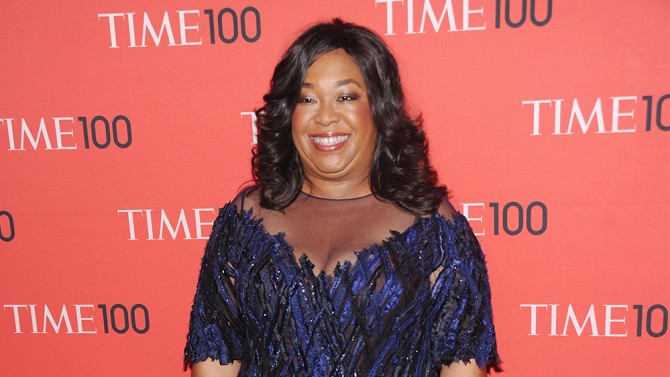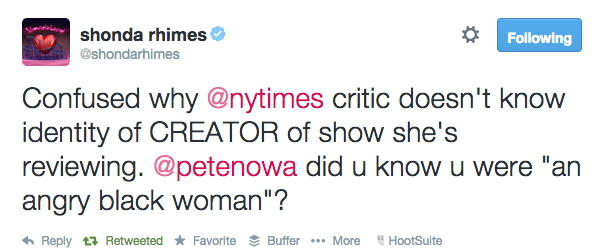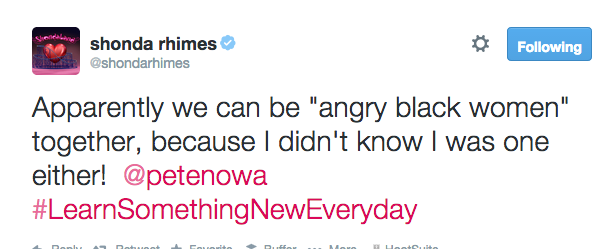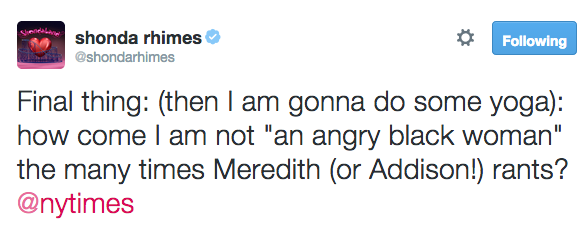
I thought about whether or not I wanted to dignify the verbal sludge that is Alessandra Stanley’s article about How To Get Away With Murder (and Grey’s Anatomy and Scandal) showrunner Shonda Rhimes with a response. I eventually decided, “yes, I will,” because Stanley’s racism has already been unfairly dignified by publication in the New York Times. And though so many writers have already called out the error-prone Stanley and her elite publisher, I’m joining in on the roast because the media world needs to send a very strong message: we will not tolerate this blatant racism.
Stanley’s piece is a tone-deaf attempt to praise the legendary Shonda Rhimes, creator of Grey’s Anatomy, Scandal and showrunner and executive producer of upcoming drama How To Get Away With Murder. Here is the jaw-dropping lede that frames the entire piece:
“When Shonda Rhimes writes her autobiography, it should be called How to Get Away With Being an Angry Black Woman.”
(How did that lede get past an editor? I have no idea, but the Times has been into shocking, awful ledes lately).
Here’s Stanley’s equally offensive thesis of her piece, titled Wrought in Their Creator’s Image:
“Ms. Rhimes has embraced the trite but persistent caricature of the Angry Black Woman, recast it in her own image and made it enviable. She has almost single-handedly trampled a taboo even Michelle Obama couldn’t break.”
For good measure, the piece includes some racist puns, too, referring to The Help stars Viola Davis and Octavia Spencer like this:
“Maybe it’s karma, or just coincidence with a sense of humor, but some of the more memorable actresses in [The Help] (its star Emma Stone, who played a young writer championing civil rights, is not one of them) are now all on network television, only this time, the help is on top.”
The “Angry Black Woman” is an insidious caricature that dehumanizes black women, depicting them as vehicles for irrational rage above all else, rather than as full human beings who exist within a greater culture or context. To characterize Shonda Rhimes, one of television’s most powerful showrunners period, as any form of an “Angry Black Woman” can be nothing but reductive.
But it gets more bizarre: Stanley thinks that Shonda Rhimes sees herself as a stereotype, but one that’s positive! And apparently, Rhimes then takes this reductive self-identity and creates her characters to be just like her (not powerful, but angry, which is her salient characteristic, apparently). And actually, she does this with just the black ones, because of course those are the only ones she could ever relate to:

Stanley is reaching, in this piece. We know she is reaching far, too, because in her haste to make her grotesque argument, she misses the fact that Murder is created by a white guy named Peter Nowalk:

The weird thing, though, is that Stanley doesn’t have to reach at all to find a common theme in Rhimes’s incredible body of work. Her female leads are all powerful and intimidating. They all have stressful, high-power and high-profile careers. They are complex characters with a full range of emotions. They showcase diversity without ever tokenizing their characters. These are the reasons Rhimes is so groundbreaking.
Despite the criticism from other journalists, the Twitter community-at-large, and even Rhimes herself, Stanley thinks that her piece is just fine. She said that the backlash was silly because “the whole point of the piece — once you read past the first 140 characters — is to praise Shonda Rhimes for pushing back so successfully on a tiresome but insidious stereotype.”
It’s unbelievably condescending to dismiss our criticisms as a product short of attention spans. And more importantly — casual or benign racism is still racism. In fact, it’s the most insidious kind of racism because it’s so hard to stamp out. There are a thousand ways you can say offensive, racist stuff while still “praising” someone of color (“You have such unique hair, can I touch it?” or “You look so exotic!”). For people of color, these undermining comments are another reminder that we are still misunderstood and still seen as different or as foreign.
There were critics — good, influential critics — who actually said there are some valid insights to be gained from Stanley’s piece. Saying this about Stanley’s piece is like having money to go to the store, but instead rummaging through the alleyway dumpster to find a few pieces of stale bread to eat. There are only a few valid observations in Stanley’s piece, but they are hardly new ones, and now they being examined by a lens that sees Rhimes in the context of a stereotype, not as a human being.
Rhimes has said, in several interviews, that her work doesn’t inherently deal with race or women of color. Her work isn’t angry, and she isn’t angry. She aims to tell captivating stories on TV that reflect the diversity of real life. This is because people of color, just like white people, can and do sit around and talk about things that have nothing to do with race (!).
Rhimes is an icon in the industry because she has helped put women of color at the forefront and, in doing so, has shown stodgy television executives that women of color are as bankable as white people. She has broken down stereotypes because in Rhimes’s world, women, be it Black, Asian, White or Hispanic, don’t act as representatives for an entire race or culture. There are just women, portrayed on the screen like they are in real life.







